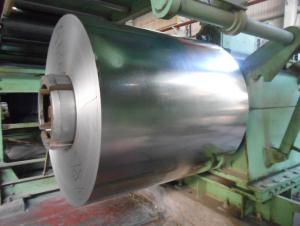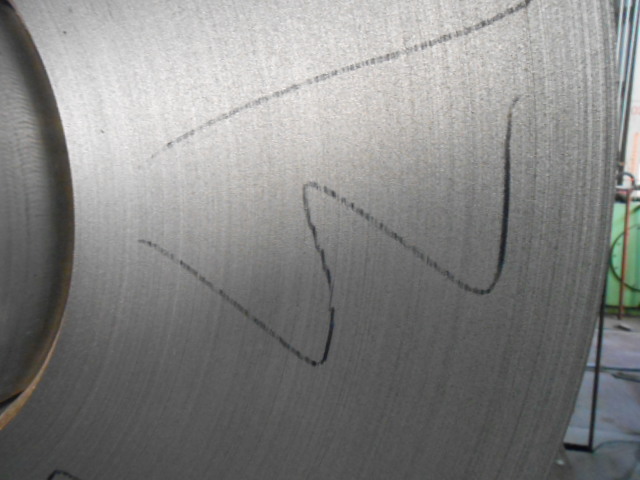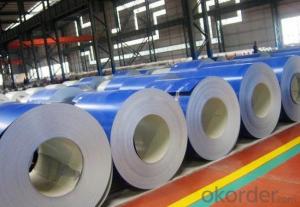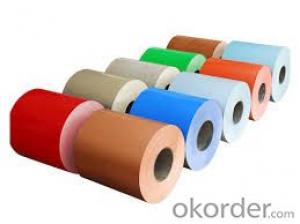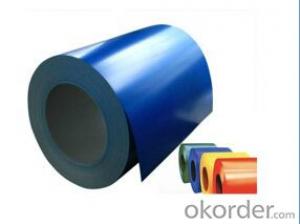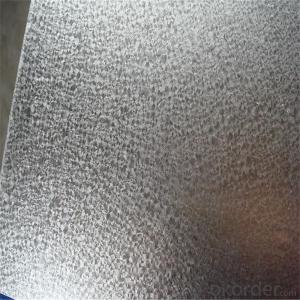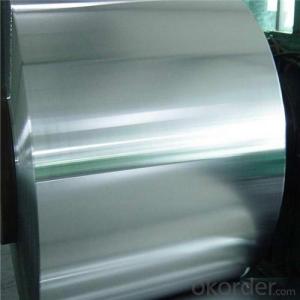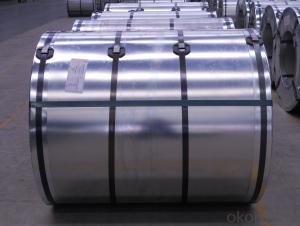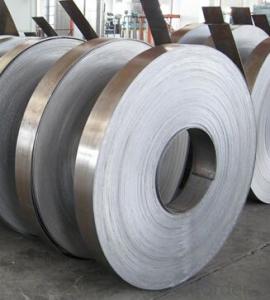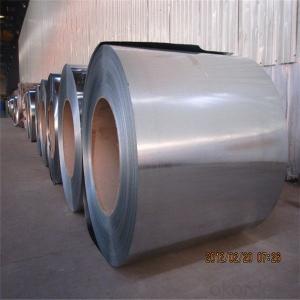ALUZINC STEEL COIL---0.29
- Loading Port:
- China Main Port
- Payment Terms:
- TT OR LC
- Min Order Qty:
- -
- Supply Capability:
- -
OKorder Service Pledge
OKorder Financial Service
You Might Also Like
product information:
The Galvalume is a kind of coated steel coil/sheet. With the cold rolled steel of different strength and thickness as substrate, it is produced through applying Al-Zn coat on both faces by hot dip process. In its coating, Al accounts for about 55%, Si 1.6%, while the remaining is Zn. It enjoys both the physical protective feature and durability of Al and the electrochemical protective property of Zn. And its surface has bright silver color and regular embossed-like figure, which are highly decorative.
Specification
1. Thickness: 0.3-0.7mm
2. Width: 914-1250mm
3. Inner Diameter: 508-610mm
4. Weight of Steel Coil: 3-15MT
5. Coating Type: Al-Zn Alloy
6. Available Dipped Layer: 50-150g/m2
7. Surface Finish Structure: Normal Spangle & Small Spangle & Zero Spangle
8. Available Surface Treatment: Passivating & Oiling & AFP & Filming
Mechanical Properties
Grade | Tension Test | ||
Yield Strength (MPa) | Tensile Strength (MPa) | Elongation% No Less Than | |
A80mm | |||
DX51D+AZ | 140-350 | 270-500 | 22 |
DX52D+AZ | 140-300 | 270-420 | 26 |
DX53D+AZ | 140-260 | 270-380 | 30 |
Application
1. Architecture Roofs and outside walls of civilian and industrial buildings, garage doors, fencings and window blinds
2. Appliances Industry Outer clad sheets for washing machine, refrigerator, television, air conditioner and ventilation system, explosion-proof strip, solar water heater and appliance parts
3. Auto Industry Muffler, heat shields of exhaust pipe and catalytic converter, auto parts & accessories under the frame, signboard in highway
4. Industrial Instruments Electric control cabinet, industrial refrigeration equipment, automatic vending machine
- Q: I got my dog those nice looking stainless steel water and food bowls (looks great next to my kitchen appliances...haha). The thing is my dog will drink from the toilet or a plastic bowl but not out of his bowl...I was wondering if those stainless steel bowls change the taste of food and water?
- Well, I know the water at this restaurants where they use metal pitchers taste a bit off to me. There's nothing wrong with the water, but I think the metal pitcher throws off the flavor. Could be the same with the metal bowl and the dog. Plastic is only a problem at hiding bacteria if it gets scratched up badly (which isn't as likely to happen with water as long as the dog doesn't chew it. You can also put the plastic crock bowls on the top shelf of a dishwasher for cleaning as the heat kills most germs.
- Q: How do steel coils perform in extreme weather conditions?
- Steel coils are designed to withstand extreme weather conditions due to their durability and strength. They are often coated or galvanized to protect against corrosion, making them highly resistant to rust and other forms of weather damage. Additionally, the structural integrity of steel coils allows them to withstand high winds, heavy precipitation, and temperature fluctuations without significant deformation or damage.
- Q: What is stainless steel 316, and what are its properties and uses?
- 316 is the second most common grade (after 304); for food and surgical stainless steel uses; alloy addition of molybdenum prevents specific forms of corrosion. It is also known as marine grade stainless steel due to its increased resistance to chloride corrosion compared to type 304. 316 is often used for building nuclear reprocessing plants. 316L is an extra low carbon grade of 316, generally used in stainless steel watches and marine applications, as well exclusively in the fabrication of reactor pressure vessels for boiling water reactors, due to its high resistance to corrosion. 316Ti includes titanium for heat resistance, therefore it is used in flexible chimney liners.
- Q: How do steel coils contribute to durability and longevity in products?
- The durability and longevity of products are greatly enhanced by steel coils, mainly because of their strength, stability, and resistance to corrosion. Firstly, steel is widely known for its exceptional strength, making it the perfect material for applications where durability is crucial. Steel coils, which are essentially tightly rolled steel, add strength and structural integrity to products. The stability offered by steel coils is another important factor in improving product durability. The tightly rolled structure of the coils ensures that they maintain their shape and resist deformation even under heavy loads or extreme conditions. This stability is particularly significant in industries like construction and automotive, where products need to withstand rigorous usage for long periods of time. Furthermore, steel coils have excellent resistance to corrosion, primarily due to the presence of protective coatings. These coatings, such as zinc or other metallic alloys, act as a barrier against moisture and environmental elements that cause rust and degradation. By preventing corrosion, steel coils help extend the lifespan of products, making them more durable and reliable. Moreover, steel coils can be customized to meet specific requirements, such as different thicknesses, widths, or surface finishes. This versatility allows manufacturers to tailor the steel coils to their desired application, ensuring optimal performance and longevity in their products. To sum up, steel coils contribute to the durability and longevity of products through their strength, stability, corrosion resistance, and customization capabilities. By incorporating steel coils into various industries and applications, manufacturers can ensure that their products last longer and provide greater reliability to consumers.
- Q: What are the main characteristics of steel coils?
- The main characteristics of steel coils include their high strength and durability, excellent corrosion resistance, and ability to be easily formed and shaped. They are typically made from carbon steel and come in various widths, thicknesses, and lengths. Steel coils are commonly used in a wide range of industries such as construction, automotive, and manufacturing for applications such as roofing, structural components, and electrical appliances.
- Q: How are steel coils used in the production of signage?
- Steel coils are used in the production of signage as they provide a durable and versatile material for creating sturdy sign structures. The steel coils are typically cut into desired shapes and sizes, then bent, welded, or formed to create the framework of the signs. This allows for the creation of different types of signs, such as billboards, street signs, or large display signs. The steel coils' strength and resistance to weather make them ideal for outdoor signage that needs to withstand various environmental conditions.
- Q: What are the advantages of using steel coils in the manufacturing industry?
- There are several advantages of using steel coils in the manufacturing industry. Firstly, steel coils provide excellent strength and durability, making them ideal for applications that require high load-bearing capacity. Secondly, steel coils are highly resistant to corrosion, making them suitable for outdoor or harsh environments. Additionally, steel coils offer consistent and uniform properties, ensuring reliable and precise manufacturing processes. Moreover, steel coils can be easily formed and shaped, allowing for versatile use in various industries. Lastly, steel coils are recyclable, making them an environmentally friendly choice.
- Q: How are steel coils used in the production of automotive chassis?
- Steel coils are used in the production of automotive chassis as they are cut and shaped into various components, such as frame rails and crossmembers, which form the structural foundation of the vehicle. The high strength and durability of steel make it an ideal material for chassis construction, providing stability and safety to the overall vehicle structure.
- Q: What are the common problems encountered with steel coils during production?
- Some common problems encountered with steel coils during production include surface defects such as scratches, rust, and scale formation, dimensional deviations, coil breaks or tears, edge defects, and coil slippage. Other issues may include coil handling and storage problems, coil winding or coiling defects, and quality control problems such as inconsistent chemical composition or mechanical properties.
- Q: Corten steel tends to overheat in hot environments? (for example copper heats up under the sun)
- Bill summed it up pretty quick and provided a link. For some reason you are focusing on the copper content when it really is insignificant in the overall picture of the sun hitting its surface. If you could elaborate more, maybe we could offer a better answer.
Send your message to us
ALUZINC STEEL COIL---0.29
- Loading Port:
- China Main Port
- Payment Terms:
- TT OR LC
- Min Order Qty:
- -
- Supply Capability:
- -
OKorder Service Pledge
OKorder Financial Service
Similar products
Hot products
Hot Searches
Related keywords
